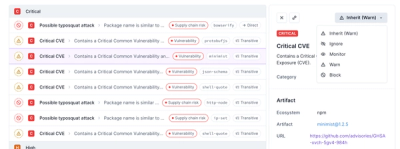
Research
Security News
Malicious npm Package Typosquats react-login-page to Deploy Keylogger
Socket researchers unpack a typosquatting package with malicious code that logs keystrokes and exfiltrates sensitive data to a remote server.
conventional-changelog-cli
Advanced tools
Package description
The conventional-changelog-cli package is a command-line tool that helps automate the process of generating changelogs based on conventional commit messages. It follows the Conventional Commits specification, which is a standardized way of writing commit messages that makes it easier to create automated tools for versioning and changelog generation.
Generate Changelog
This command generates a changelog based on the Angular preset and writes it to the CHANGELOG.md file. The '-s' flag ensures that the file is saved.
npx conventional-changelog -p angular -i CHANGELOG.md -sGenerate Changelog for a Specific Release
This command generates a changelog for the last two releases based on the Angular preset and writes it to the CHANGELOG.md file.
npx conventional-changelog -p angular -i CHANGELOG.md -s -r 2Generate Changelog for a Specific Commit Range
This command generates a changelog for commits in a specific path or range and writes it to the CHANGELOG.md file.
npx conventional-changelog -p angular -i CHANGELOG.md -s --commit-path ./path/to/commitsstandard-version is a tool for versioning and changelog generation based on conventional commit messages. It automates the process of version bumping, changelog generation, and Git tagging. Compared to conventional-changelog-cli, standard-version provides a more integrated approach to version management and release automation.
semantic-release automates the whole package release workflow including determining the next version number, generating the changelog, and publishing the package. It uses the commit messages to determine the type of changes in the codebase. Compared to conventional-changelog-cli, semantic-release offers a more comprehensive solution for continuous delivery and release management.
release-it is a versatile CLI tool for automating versioning and package publishing. It supports conventional changelog generation and can be extended with plugins for additional functionality. Compared to conventional-changelog-cli, release-it provides a more flexible and extensible approach to release automation.
Readme
Generate a changelog from git metadata
Note You don't have to use the angular commit convention. For the best result of the tool to tokenize you commit and produce flexible output, it's recommended to use a commit convention.
$ npm install -g conventional-changelog-cli
$ cd my-project
$ conventional-changelog -p angular -i CHANGELOG.md -s
This will not overwrite any previous changelog. The above generates a changelog based on commits since the last semver tag that match the pattern of a "Feature", "Fix", "Performance Improvement" or "Breaking Changes".
If you first time use this tool and want to generate all previous changelog, you could do
$ conventional-changelog -p angular -i CHANGELOG.md -s -r 0
This will overwrite any previous changelog if exist.
All available command line parameters can be listed using CLI: conventional-changelog --help.
Hint: You can alias your command or add it to your package.json. EG: "changelog": "conventional-changelog -p angular -i CHANGELOG.md -s -r 0".
To fully customize the tool, please checkout conventional-changelog and conventional-changelog-core docs. You can find more details there. Note: config here can work with preset, which is different than options.config in conventional-changelog.
package.jsonconventionalChangelogpackage.json and CHANGELOG.md filesThe reason why you should commit and tag after conventionalChangelog is that the CHANGELOG should be included in the new release, hence gitRawCommitsOpts.from defaults to the latest semver tag.
npm versionUsing the npm scripts to our advantage with the following hooks:
{
"scripts": {
"version": "conventional-changelog -p angular -i CHANGELOG.md -s -r 0 && git add CHANGELOG.md"
}
}
You could follow the following workflow
npm version [patch|minor|major] commandYou could optionally add a preversion script to package your project or running a full suit of test.
And a postversion script to clean your system and push your release and tags.
By adding a .npmrc you could also automate your commit message and set your tag prefix as such:
tag-version-prefix=""
message="chore(release): %s :tada:"
MIT © Steve Mao
FAQs
Unknown package
The npm package conventional-changelog-cli receives a total of 119,340 weekly downloads. As such, conventional-changelog-cli popularity was classified as popular.
We found that conventional-changelog-cli demonstrated a healthy version release cadence and project activity because the last version was released less than a year ago. It has 4 open source maintainers collaborating on the project.
Did you know?

Socket for GitHub automatically highlights issues in each pull request and monitors the health of all your open source dependencies. Discover the contents of your packages and block harmful activity before you install or update your dependencies.

Research
Security News
Socket researchers unpack a typosquatting package with malicious code that logs keystrokes and exfiltrates sensitive data to a remote server.

Security News
The JavaScript community has launched the e18e initiative to improve ecosystem performance by cleaning up dependency trees, speeding up critical parts of the ecosystem, and documenting lighter alternatives to established tools.

Product
Socket now supports four distinct alert actions instead of the previous two, and alert triaging allows users to override the actions taken for all individual alerts.